Book review December 2024
From AI to queer love: 6 books by members of the UU community to read this winter
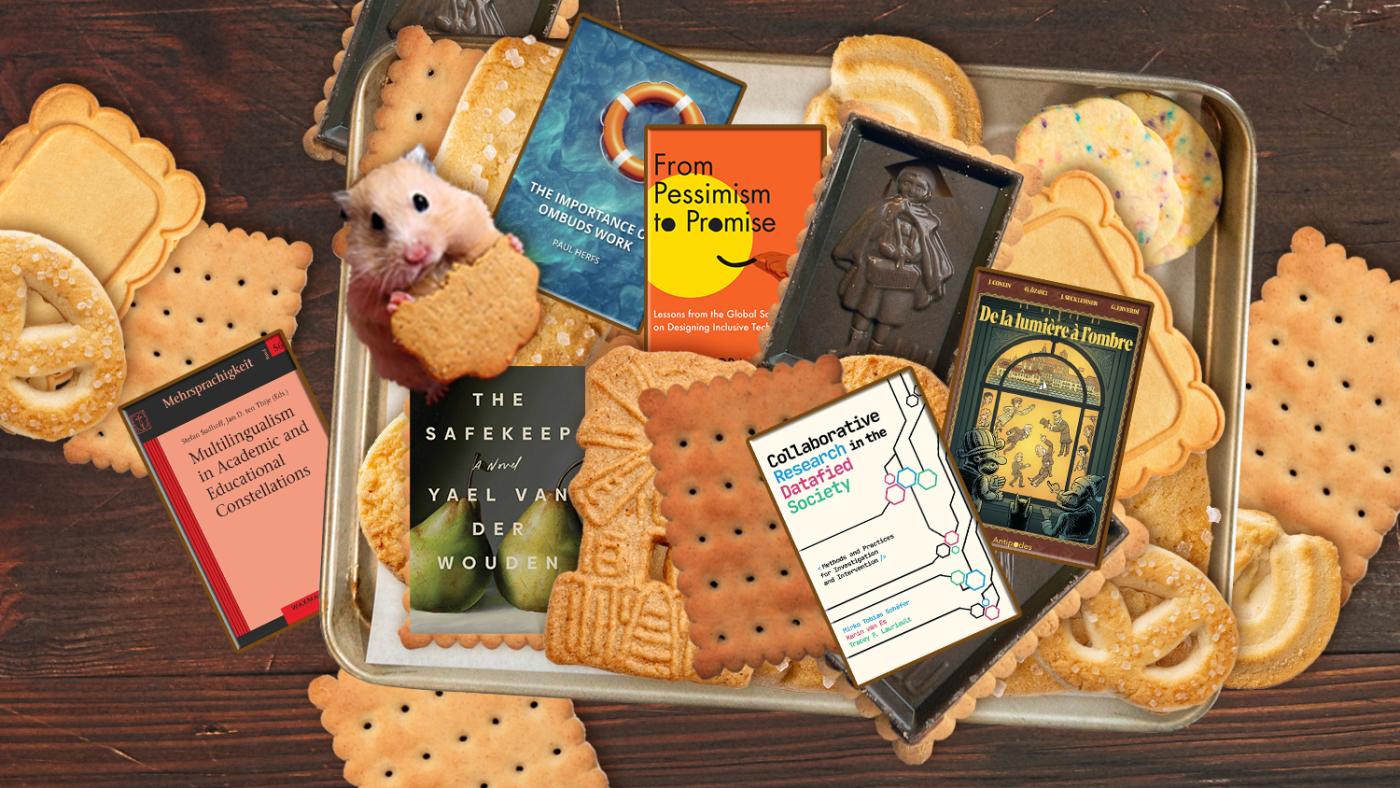
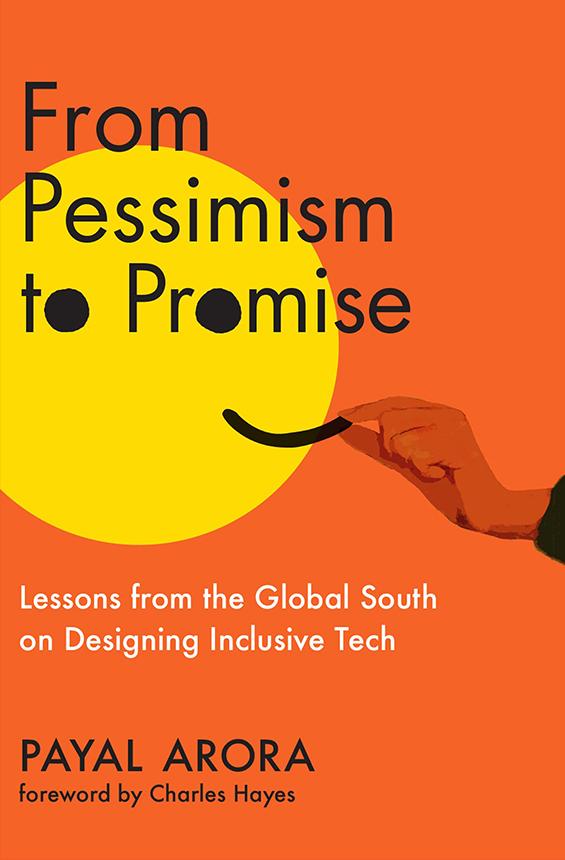
An optimistic approach to our digital future
Though headlines warn the West about the dangers of artificial intelligence, Payal Arora offers a more hopeful perspective in From Pessimism to Promise: Lessons from the Global South on Designing Inclusive Tech. The Professor of Inclusive AI Cultures draws on her expertise and diverse global contexts to push for an optimistic approach to our digital future. The technology is already here, so how can we use it wisely?
All five chapters contain a balanced amount of academic research and demonstrations of user experience in the Global South. Arora highlights that technology is valuable and desired among this significant group of people. To them, technology is about self-actualisation, economic potential, and the possibility to reinvent communities. By looking at influencers in Bangladesh and gossiping Saudi schoolgirls, Arora forces us to see the positive influence technology can bring to these communities.
That does not mean Arora shies away from a critical examination of digital technologies. She talks about how harmful technological empires can be, the damage data fields cause to nature, and Western biases in algorithmic design. However, instead of dwelling on potentially pessimistic thoughts, the UU professor urges us to reimagine digital spaces by incorporating indigenous knowledge into this vision. With her positive writing style, concrete examples and clear analyses, Arora provides a convincing argument that might just convince readers that these systems will contribute to a better future.
Above all, Arora reminds us that digital spaces are social spaces, a cultural phenomenon, and an ideology. We may wonder how realistic her plea is, seeing how our society’s relationship with technology would need tremendous work to achieve her vision. But at least we are posed with the challenge to stop dwelling in pessimism and start reimagining our digital societies. Perhaps only then will the West finally succeed in regarding technology as a tool to promote equity and progress in our ever-interconnected world. (Reema Dandachi)
Payal Arora, From pessimism to promise: Lessons from the Global South on Designing Inclusive Tech. MIT Press, 2024 26,95 dollars (hardcover), E-book 16,99 dollars
This book from Arora is recently longlisted for the Porchlight Business Book Awards
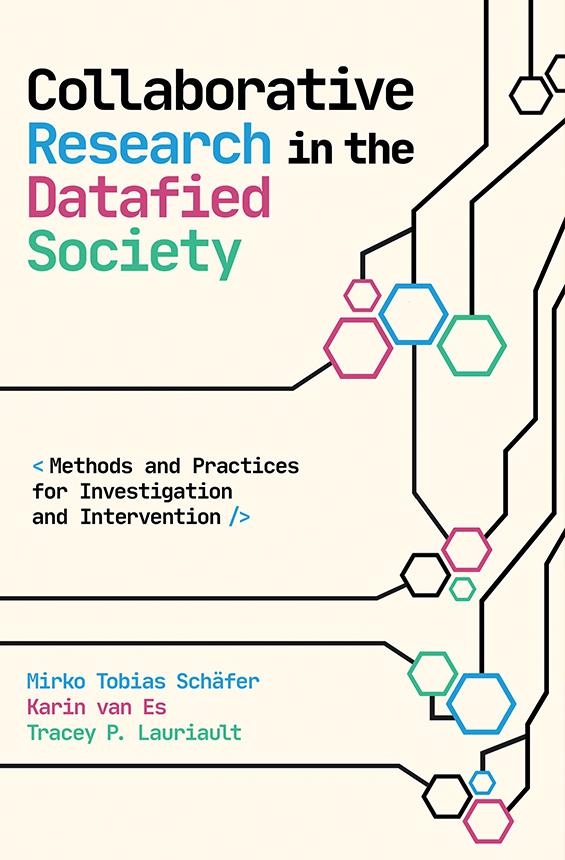
The revolutionary influence of scientists
Can universities change the world? According to Collaborative Research in the Datafied Society, edited by Mirko Tobias Schäfer, Karin van Es and Tracey P. Lauriault, the answer is a resounding "yes" - provided they break through the walls of academia. UU scientists Schäfer and Van Es play a prominent role in this book, which shows how cooperation between researchers and social partners can be not only necessary but also revolutionary.
The book offers a rich collection of examples of how universities can tackle complex social issues. One of them is Data Against Feminicide, a project against gender-based violence that involved data scientists and activists. They teamed up to develop digital tools to make figures about murdered women more visible. Another example is the collaboration between researchers and local governments for the DataWorkplace project, which explores how governments can use data and AI to develop fairer and more transparent services. Fairwork Project offers a critical look at unfair practices perpetrated by companies like Uber, looking to enforce better working conditions in the platform economy.
The book also explores theoretical issues around collaboration. For example, how can academics remain neutral when they are actively involved in policy-making? What does it mean to make science open and inclusive in a world increasingly dominated by datafication?
What makes this work truly thought-provoking is its call to action. The authors ask if universities dare to go beyond papers and theories. Do they dare to collaborate with policymakers, businesses and citizens to increase its impact? Utrecht University seems to be leading by example, but the question remains whether others will follow.
With gripping insights and real-life stories, this book is not only a manual for researchers but also a wake-up call for academia. After all, as evidenced in the book, collaboration is no longer optional, it is essential. (Phine Hazelbag)
Mirko Schäfer, Karin van Es & Tracey P. Lauriault, Collaborative Research in the Datafied Society. Amsterdam University Press. 2024. 129 euros (hardcover). The e-book version is free.
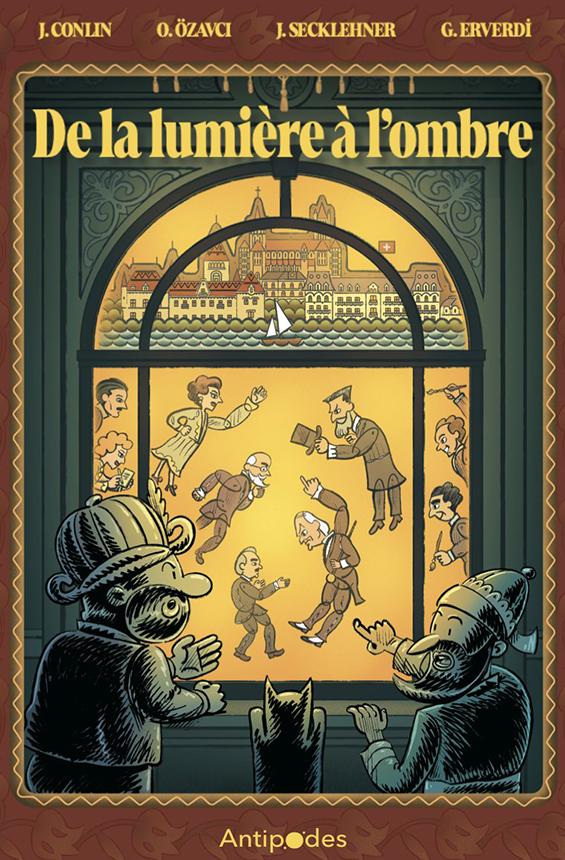
From a (shadow) puppet show to the real world
It's not every day that you see a scientific research project accompanied by a graphic novel. But that's what happened with The Lausanne Project, which studied international relations in the Middle East during the Interwar period. It starts with the Treaty of Lausanne, concluded between Turkey and the Allies after the end of the First World War. To make this history better known, UU historian Ozan Ozavci and others wrote the comic book Out of Shadows, featuring artwork by the Turkish cartoonist Gökçe Erverdi.
In the comic, the characters Hacivat and Karagöz, beloved in Turkey, step out of their shadow puppet theatre into the "real" world of 1921. They travel to Lausanne to get involved in peace negotiations, hoping to end the French occupation of their region and score a lucrative oil deal. There, they meet the key negotiators and discover the geopolitical and economic interests at play behind the scenes. Though this sounds very serious, the story also has several unconventional moments and all kinds of adventures. So much so that the peace process and eventual outcome get somewhat snowed under, but that's not a bad thing. The story ends with a clever twist that straightens out all the less believable plot twists in one go.
The graphic novel is drawn in clear, simple lines, and nicely coloured. The dynamic "camerawork" is striking: there is a lot of dialogue, but the pictures are drawn from different angles, so it never gets boring. The book pays a successful homage to the "real" people in Lausanne, who are portrayed in the style of two Hungarian cartoonists who commented on the negotiations at the time. (Niels Bongers)
Gökçe Erverdi, Jonathan Conlin, Ozan Ozavci & Julia Secklehner. De la lumière à l'ombre . French edition published by Antipodes, CHF 35. The English edition of the book, titled "Out of Shadows", is coming soon.
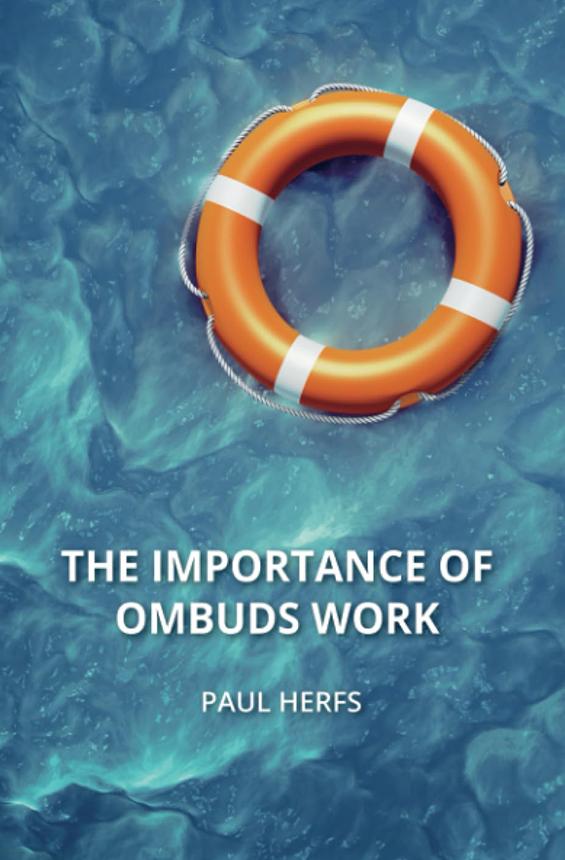
The importance of having ombudspeople at universities
He may be retired, but he is not idle. Paul Herfs, known by many UU employees as the confidential adviser who fought for the title of ombudsperson, published the book The Importance of Ombuds Work in February. Written in English, this paperback explains why having an ombudsperson is important for employees and the organisation, and why universities should be forced by law to have one. He also analyses the topic beyond the borders of the Netherlands.
According to Herfs, an ombudsperson is indispensable as they support employees when they have problems with their managers. An ombudsperson can also support managers looking to resolve turmoil in the workplace as quickly as possible. This benefits the entire organisation. Hers talked about this subject in his farewell interview with DUB, in early 2021, titled "Everyone benefits when a conflict or unsafe situation is remedied."
Although the position of ombudsperson for educational institutions is included in the collective labour agreement, there is no legal obligation to appoint one. As a result, not every institution has an ombudsperson. Herfs explains that many institutions see the role as a parasite that can harm the organisation. The lack of legal obligation also makes the ombudsperson vulnerable because they depend on the Executive Board's goodwill.
The book includes many examples from the 16 years Herfs worked as an ombudsman. He cites cases from Utrecht and other universities in the Netherlands and abroad which are still relevant today. This is a necessary read for anyone who downplays or denies the importance of an ombudsperson.(Gwenda Knobel)
Paul Herfs, The importance of ombuds work, Brave new books, 2024, 19.86 euros
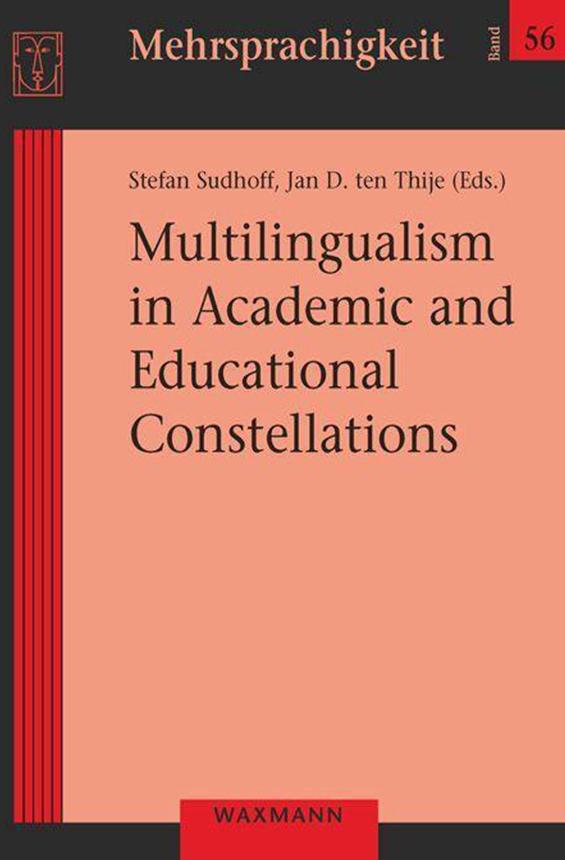
In defence of a more nuanced approach to multilingualism in academia
Multilingualism in Academia, by emeritus professor Jan D. ten Thije and assistant professor Stefan Sudhoff, offers an insightful exploration of the role of multilingualism in academic settings, addressing the challenges and opportunities of multilingual communication in universities and research institutions. The presentation of content in both English and German reflects the multilingual ethos it advocates, discussing how academic practices and policies can be shaped to harness linguistic diversity in increasingly international classrooms. Structured into four parts, the book examines foundational linguistic theories followed by case studies of multilingual practices in various academic environments.
As internationalisation continues to reshape higher education, Thije and Sudhoff’s work calls for a critical re-examination of English use in academia. It acknowledges the pragmatic necessity of a lingua franca for cross-country research and collaboration, yet urges a more nuanced approach that recognizes the value of integrating different languages and cultural perspectives in universities.
On this note, special attention is drawn to the EMP Project on Receptive Language at Utrecht University, which holds great relevance in light of the ongoing debates surrounding the rapid internationalization of Dutch universities and the resulting "Englishization" of academic teaching and learning. This pilot program promotes the use of Lingua Receptiva, implying that both teachers and students use the general language of instruction while being allowed to choose another language in discussions and written assignments. By permitting individuals to communicate in their strongest language, the initiative seeks to challenge the dominance of English, reducing pressure on non-native speakers, and fostering greater inclusion and participation within academic settings.
Through its in-depth analysis, Multilingualism in Academia convincingly underlines the importance of rethinking traditional language pedagogies in favour of multilingual ones, revealing deeper facets of internationalization and transnational educational spaces. It advocates for academia to embrace and promote intellectual pluralism, making universities spaces where different linguistic and cultural identities can thrive equally and together contribute to the advancement of knowledge. (Paola Di Stefano)
Jan D. ten Thije and Stefan Sudhoff, Multilingualism in Academia. Waxmann. 2024. 44,90 euros. The e-book version is free.
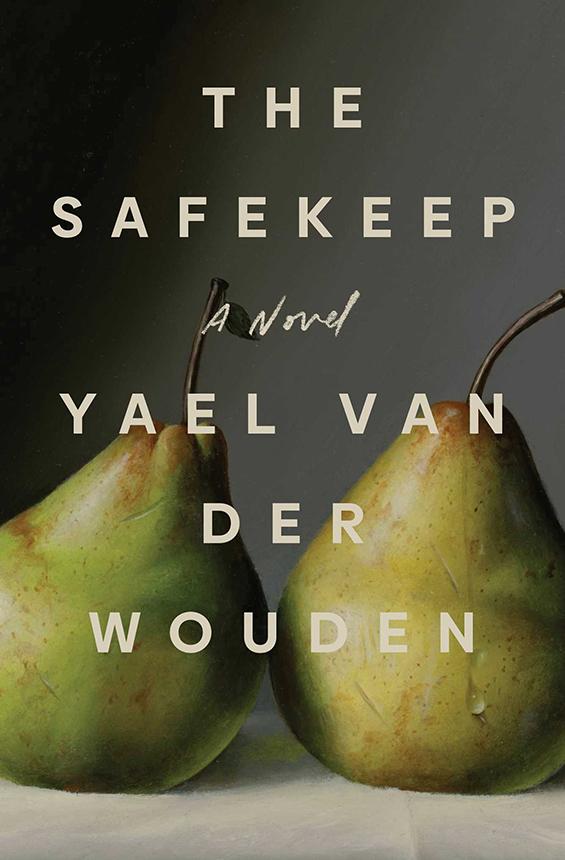
A quietly devastating queer love story
It's not common for a debut novel by a Dutch writer to be acclaimed with this much enthusiasm internationally. Yael van der Wouden, UU graduate and guest lecturer at Parnassos, was the first Dutch writer to be nominated for the prestigious Booker Prize. She wrote The Safekeep in English, which is why she was nominated for the Booker Prize and not the International Booker Prize, which awards international books translated into English. The judges described her book as a "quietly devastating queer love story that reveals itself as a story about the Holocaust." In the end, Van der Wouden didn't win the Booker Prize. The award went to the British writer Samantha Harvey for her book Orbital.
The Safekeep is set in post-war Overijssel. Isabel lives alone in her childhood home, which she keeps after her mother dies. She is unfriendly and aloof towards others, ensuring that no one intrudes on her life. Isabel's peace is brutally disrupted when Eva, her brother's new girlfriend, is forced to come and live with her. Eva is warm-hearted and sprightly, everything Isabel is not. Enough reason to hate her. Then, little things start disappearing from the house: a spoon, a knife, a bowl.
Isabel's anger turns out to be a way to protect herself from her feelings for Eva. The book unfolds into a gripping love story. Van der Wouden manages to portray the complicated love affair in difficult dialogues, silences and unspoken words. She is not sparing with weighty descriptions, which means that her message about lust and depravity is thickly laid on in some passages. (Isabella Hesselink)
Yael van der Wouden, The Safekeep. Penguin. 2024. 16,99 pounds. e-book 7,99 pounds